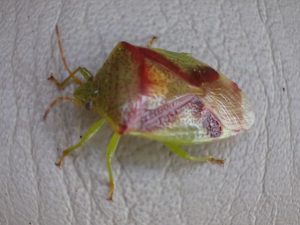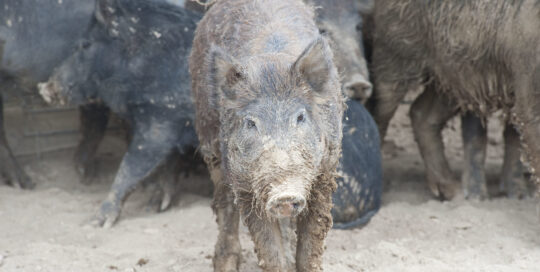Stink Bugs and Shield Pugs: Pests that Thrive in Warm Weather
Views: 4718

As the weather heats up it seems so does the pest pressure. Some species that thrives despite the heat are the stink and shield bugs. Stink bugs, (Pentatomidea) is a huge family, including such characters as the brown marmorated stink bug, a non-native species that causes problems on fruit, as well as being a nuisance when the weather cools in the fall. In the garden stink bugs will eat, or rather suck out the juices, of practically anything. And when they do so, it can cause the plant to wilt and weaken. As you can guess if you squash a stink bug it’s not going to smell very good.
The photo I took was when we were out fishing in the mountains and is Elasmostethus cruciatus, the Red-Cross Shield Bug. It looks similar to others in the Pentatomidea family (and it was a doozy identifying), but they tend to have more specific taste in plant matter so they don’t tend to bother the home garden quite as much.
Getting Rid of Stink Bugs
To stay ahead of stink bugs before they’re a problem tart early in the season to look for tiny, barrel-shaped eggs in rows on the undersides of the leaves. One female can lay hundreds so they are very prolific. Once they hatch into small rounded nymphs that might have yellow or red markings on them, it’s a short 4 weeks before the mature to adulthood and starts the process anew. Adults are the ones who try to find their way into our homes, or if they are going to rough it in the wild, they’ll overwinter in debris in the garden or around the yard.
We don’t have a huge issue with stink bugs even though you’ll see them now and again. For regions where they are a continual issue, being proactive by covering your plants with a lightweight floating row cover is also a useful tool if stink bugs are a common problem. Place it over the plants early in the spring, run drip hose along the ground, and keep it there throughout the season. Of course, this will solve issues with a lot of pests so it’s a good practice all the way around.
Post-invasion
But, if you have them in your garden now, you might have a bit of a battle on your hand. Unlike Colorado potato beetles, they can be fast jumping, or will even fly away. Stalk them in the morning when it’s cool, or another option is to put a sheet under your affected plants and shake them. They will fall on the sheet, and you can scoop them up and whisk them out of the garden.
If spritzing makes you feel better. Anything that is Neem based does well against the, as well as Pyrethrin products. Just don’t spray the plants when the temperature is above 90 degrees or you could risk burning the plants.
You can also encourage the presence of predatory insects that prey upon stink bugs by planting the herbs and flowers they like such as dill and cilantro. And try to keep the pesticides, organic or otherwise, to a minimum to allow these beneficial insects do what they do best.
Stink bugs can be problematic at times. Keep an eye out for those clusters of eggs so you can remove them, and if they start hitting your plants, be vigilant. You can get ahead of them!
Meet Amy Grisak
Amy is a freelance author and photographer in Great Falls, MT who specializes in gardening, foods, and sustainable agriculture. She provides information on every kind…
Amy's Recent Posts

This Little Piggy is a Problem: Dealing with Feral Hogs








